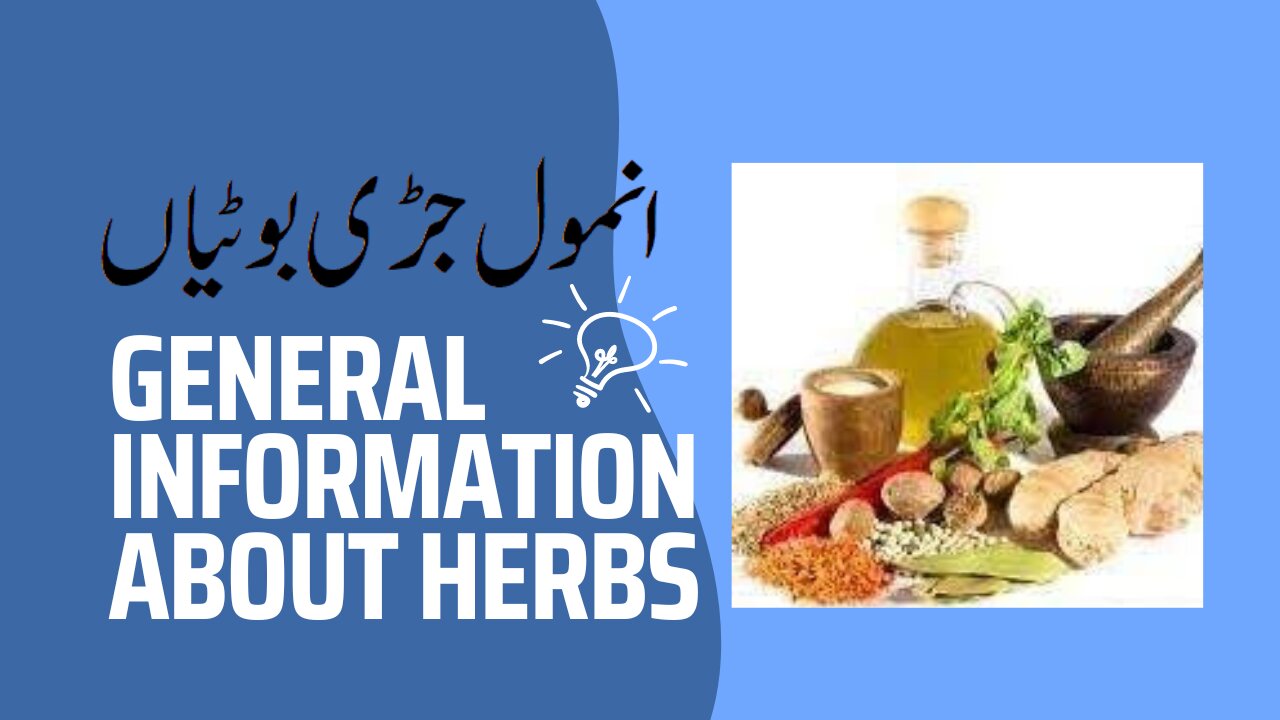Premium Only Content

genral information about herbs jari botiyan
Definition:
Herbs are plants that are valued for their aromatic, flavorful, and medicinal properties. They have been used for centuries by various cultures for culinary, medicinal, and spiritual purposes.
Types of Herbs:
Herbs can be categorized into several groups based on their uses:
Culinary Herbs: These herbs are used to enhance the flavor of food. Common culinary herbs include basil, rosemary, thyme, parsley, oregano, and mint.
Medicinal Herbs: These herbs are believed to have therapeutic properties and are used in traditional and alternative medicine. Examples include echinacea, ginseng, ginger, and chamomile.
Aromatic Herbs: These herbs are valued for their pleasing scents. Lavender, rose, and jasmine are examples of aromatic herbs used in perfumes, potpourri, and aromatherapy.
Tea Herbs: Many herbs are used to make herbal teas or infusions. Peppermint, chamomile, hibiscus, and lemon balm are commonly used for this purpose.
Uses and Benefits:
Medicinal Benefits: Herbs contain bioactive compounds that can have various health benefits. For example, garlic is believed to have cardiovascular benefits, and turmeric has anti-inflammatory properties.
Culinary Uses: Herbs add depth and complexity to dishes. They can be used fresh, dried, or as extracts to flavor foods.
Aromatherapy: Essential oils derived from herbs are used in aromatherapy for relaxation and mood enhancement.
Traditional Medicine: Many traditional medicine systems, such as Ayurveda and Traditional Chinese Medicine, use herbs to treat a wide range of ailments.
Gardening: Herbs are popular choices for home gardens due to their relatively easy cultivation and versatility.
Precautions:
While herbs offer many benefits, there are important considerations:
Dosage: Some herbs can be potent and should be used in moderation. Consultation with a healthcare professional is recommended, especially if using herbs for medicinal purposes.
Interactions: Certain herbs can interact with medications. Inform your healthcare provider about any herbs you're using, especially if you're on prescribed medications.
Allergies: Individuals with plant allergies may also be allergic to certain herbs. Proceed with caution if you have known allergies.
Quality: The quality of herbs can vary. Choose reputable sources for purchasing herbs, especially if using them for medicinal purposes.
Pregnancy and Children: Some herbs are not safe for pregnant women or young children. Always consult a healthcare professional in these cases.
Cultivation:
Many herbs can be easily grown in gardens, pots, or indoors. They typically prefer well-drained soil and adequate sunlight. Some, like mint and basil, can be quite prolific and might need containment.
In conclusion, herbs are versatile plants that have been valued for their wide-ranging uses throughout human history. Whether you're enhancing your cooking, seeking natural remedies, or simply enjoying their scents, herbs offer a diverse array of benefits.
-
 1:05:22
1:05:22
Timcast
2 hours agoLiberals Claim TRUMP DIED Or Is Dying And Will RESIGN Today At 2pm
49K70 -
 LIVE
LIVE
Sean Unpaved
1 hour agoGridiron Shocks: Arch's Rough Start, Belichick's Tar Heel Tumble, & NFL Week 1 Buzz
302 watching -
 LIVE
LIVE
The Dilley Show
2 hours agoChicago in the Crosshairs, Grifters Crash Out and More! w/Author Brenden Dilley 09/02/2025
3,811 watching -
 LIVE
LIVE
StoneMountain64
31 minutes agoBattlefield Portal has already been better than I realized
61 watching -
 LIVE
LIVE
Viss
1 hour ago🔴LIVE - How To Win in PUBG - PUBG 101
102 watching -
 LIVE
LIVE
Side Scrollers Podcast
2 hours agoVoice Actor ROASTED For Racist Double Standard + Influencer FELONY After Con Threat | Side Scrollers
305 watching -
 1:53:25
1:53:25
Steven Crowder
4 hours agoThe CDC Exodus: RFK Forces Self-Purge of the Corrupt Elite
273K135 -
 LIVE
LIVE
The Rubin Report
2 hours agoDave Rubin Can’t Believe This Happened While He Was Off the Grid | Jillian Michaels Guest-Hosts
2,344 watching -
 LIVE
LIVE
Rebel News
1 hour agoFather killed in home invasion, Predator targets toddler, Who's destroying Canada? | Rebel Roundup
338 watching -
 LIVE
LIVE
TheAlecLaceShow
1 hour agoTrump Health Hoax | Warp Speed Truth | UK Protests | Guest: Sheriff Mack | The Alec Lace Show
47 watching